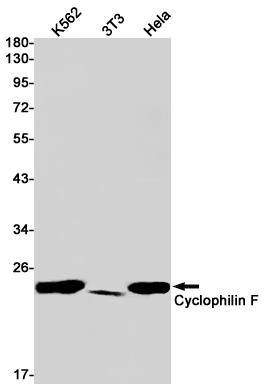-
Product Name
Anti-Cyclophilin F Rabbit antibody
- Documents
-
Description
Cyclophilin F Rabbit polyclonal antibody
-
Tested applications
WB, IHC-P, FC
-
Species reactivity
Human, Mouse, Rat
-
Alternative names
CYP3; CypD; CyP-M; Cyp-D antibody
-
Isotype
Rabbit IgG
-
Preparation
Antigen: A synthetic peptide of human Cyclophilin F
-
Clonality
Polyclonal
-
Formulation
Supplied in 50nM Tris-Glycine(pH 7.4), 0.15M Nacl, 40%Glycerol, 0.01% sodium azide and 0.05% BSA.
-
Storage instructions
Store at -20°C. Stable for 12 months from date of receipt.
-
Applications
WB: 1/1000
IHC: 1/500
FC: 1/100
-
Validations

Western blot detection of Cyclophilin F in K562,3T3,Hela cell lysates using Cyclophilin F Rabbit pAb(1:1000 diluted).Predicted band size:22kDa.Observed band size:18kDa.
-
Background
Swiss-Prot Acc.P30405.PPIase that catalyzes the cis-trans isomerization of proline imidic peptide bonds in oligopeptides and may therefore assist protein folding (PubMed:20676357). Involved in regulation of the mitochondrial permeability transition pore (mPTP). It is proposed that its association with the mPTP is masking a binding site for inhibiting inorganic phosphate (Pi) and promotes the open probability of the mPTP leading to apoptosis or necrosis; the requirement of the PPIase activity for this function is debated. In cooperation with mitochondrial TP53 is involved in activating oxidative stress-induced necrosis. Involved in modulation of mitochondrial membrane F1F0 ATP synthase activity and regulation of mitochondrial matrix adenine nucleotide levels. Has anti-apoptotic activity independently of mPTP and in cooperation with BCL2 inhibits cytochrome c-dependent apoptosis.
Related Products / Services
Please note: All products are "FOR RESEARCH USE ONLY AND ARE NOT INTENDED FOR DIAGNOSTIC OR THERAPEUTIC USE"
